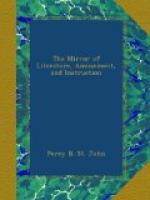* * * * *
HOW TO LOSE TIME.
Few men need complain of the want of time, if they are not conscious of a want of power, or of desire to ennoble and enjoy it. Perhaps you are a man of genius yourself, gentle reader, and though not absolutely, like Sir Walter, a witch, warlock, or wizard, still a poet—a maker—a creator. Think, then, how many hours on hours you have lost, lying asleep so profoundly,
“That the cock’s shrill clarion,
or the echoing horn,
No more could rouse you from your lazy
bed.”
How many more have you, not absolutely lost, but to a certain extent abused, at breakfast—sip, sipping away at unnecessary cups of sirupy tea, or gob, gobbling away at jam-buttered rolls, for which nature never called—or “to party giving up what was meant for mankind”—forgetting the loss of Time in the Times, and, after a long, blank, brown, and blue study, leaving behind you a most miserable chronicle indeed! Then think—O think—on all your aimless forenoon saunterings—round and round about the premises—up and down the avenue—then into the garden on tiptoe—in and out among the neat squares of onion-beds—now humming a tune by the brink of abysses of mould, like trenches dug for the slain in the field of battle, where the tender celery is laid—now down to the river-side to try a little angling, though you well know there is nothing to be had but Pars—now into a field of turnips, without your double-barreled Joe Manton, (at Mr. Wilkinson’s to be repaired,) to see Ponto point a place where once a partridge had pruned himself—now home again, at the waving of John’s red sleeve, to receive a coach-full of country cousins, come in the capacity of forenoon callers—endless talkers all—sharp and blunt noses alike—and grinning voraciously in hopes of a lunch—now away to dress for dinner, which will not be for two long, long hours to come—now dozing, or daized on the drawing-room sofa, wondering if the bell is ever to be rung—now grimly gazing on a bit of bloody beef which your impatience has forced the blaspheming cook to draw from the spit ere the outer folds of fat were well melted at the fire—now, after a disappointed dinner, discovering that the old port is corked, and the filberts all




